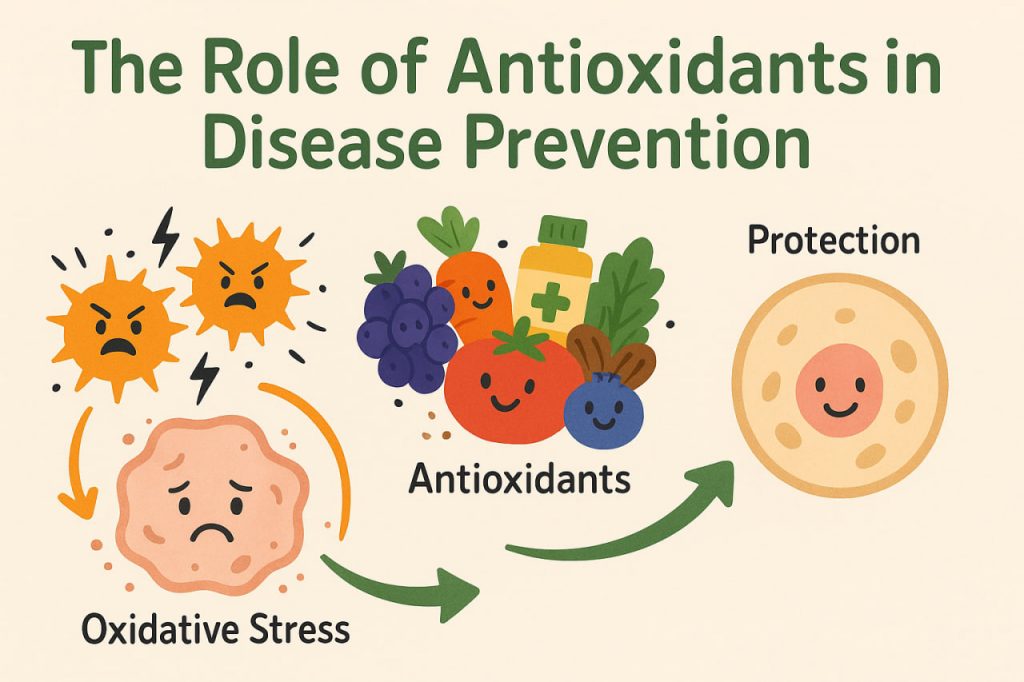Antioxidants are molecules that help protect our cells from damage caused by free radicals — unstable atoms or molecules that can harm cellular structures, including DNA, proteins, and membranes. This cellular damage, known as oxidative stress, is linked to the development of many chronic diseases, including cancer, heart disease, diabetes, and neurodegenerative disorders like Alzheimer’s. By neutralizing free radicals, antioxidants play a crucial role in maintaining health and slowing aging processes.
What Are Free Radicals and Oxidative Stress?
Free radicals are naturally produced during normal metabolic processes, especially in the presence of oxygen. However, external sources can dramatically increase their production:
- Pollution
- Radiation
- Cigarette smoke
- Industrial chemicals
- Unhealthy diets (especially high in trans fats and sugar)
When the body’s antioxidant defenses are overwhelmed, oxidative stress occurs, contributing to:
- Inflammation
- Atherosclerosis
- Cell mutation and tumor growth
- Tissue aging
- Immune system weakening
Types of Antioxidants
Antioxidants come in many forms, and they can be either produced by the body or obtained from food:
Endogenous (produced by the body):
- Glutathione
- Uric acid
- Coenzyme Q10
- Certain enzymes like superoxide dismutase
Exogenous (from diet or supplements):
- Vitamin C — water-soluble antioxidant, supports immune function
- Vitamin E — fat-soluble, protects cell membranes
- Beta-carotene — a precursor of vitamin A
- Selenium — a trace mineral essential for antioxidant enzymes
- Flavonoids and polyphenols — found in fruits, vegetables, tea, and dark chocolate
- Lycopene and lutein — found in tomatoes, leafy greens, etc.
Health Benefits of Antioxidants
Consuming a diet rich in antioxidants can help:
- Prevent cardiovascular disease by protecting blood vessels and reducing LDL oxidation
- Reduce cancer risk by defending DNA from mutation
- Support brain health and slow cognitive decline
- Improve skin health and delay signs of aging
- Strengthen immune function
- Lower inflammation in chronic conditions
However, balance is important — too many antioxidants (especially in supplement form) may interfere with normal cell signaling or become pro-oxidant in high doses.
Sources of Antioxidants in the Diet
Top antioxidant-rich foods include:
- Berries (blueberries, strawberries, raspberries)
- Dark leafy greens (spinach, kale)
- Nuts and seeds (especially sunflower seeds, almonds)
- Green tea
- Dark chocolate (70%+ cocoa)
- Tomatoes and red fruits
- Spices like turmeric and cinnamon
A diverse, plant-based diet is the most effective way to get a healthy range of antioxidants.
Do You Need Antioxidant Supplements?
Most experts recommend getting antioxidants from food, not pills. Research shows that:
- Whole foods offer a synergistic effect — nutrients work better together.
- High-dose supplements may not reduce disease risk and can even increase mortality in some groups.
- Supplements should only be used when there’s a proven deficiency or under medical supervision.
Glossary
- Antioxidant: A molecule that prevents oxidative damage by neutralizing free radicals
- Free radical: An unstable atom or molecule that damages cells
- Oxidative stress: An imbalance between free radicals and antioxidants in the body
- Polyphenols: Plant-based compounds with strong antioxidant activity
- Flavonoids: A class of antioxidants found in colorful fruits and vegetables


